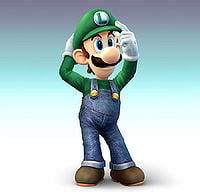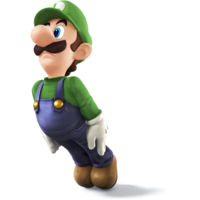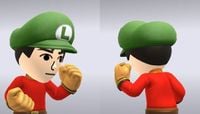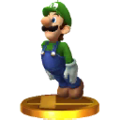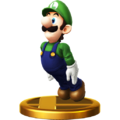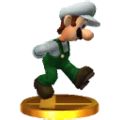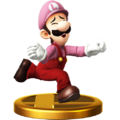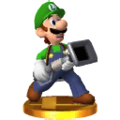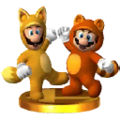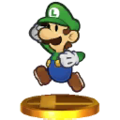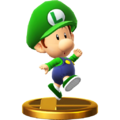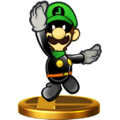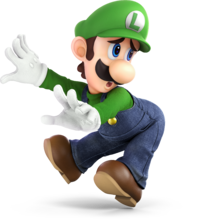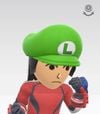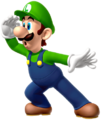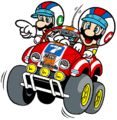Luigi
- For fighter info, see Luigi (SSB), Luigi (SSBM), Luigi (SSBB), Luigi (SSB4), and Luigi (SSBU).
| Luigi | |
|---|---|
File:Luigi'sMansion3artwork.png
Official artwork of Luigi from Luigi's Mansion 3. | |
| Universe | Mario |
| Debut | Mario Bros. (Game & Watch) (1983, technical debut) Mario Bros. (1983, official debut) |
| Smash Bros. appearances | SSB Melee Brawl SSB4 Ultimate |
| Most recent non-Smash appearance | Mario & Sonic at the Olympic Games Tokyo 2020 (2019) |
| Console/platform of origin | Game & Watch (technical debut) Arcade (official debut) |
| Species | Human |
| Gender | Male |
| Place of origin | Mushroom Kingdom |
| Created by | Shigeru Miyamoto |
| Designed by | Shigeru Miyamoto (Super Mario Bros.) Yoichi Kotabe (2D artwork) Shigefumi Hino (Super Mario World) |
| Voice actor | Charles Martinet |
| Article on Super Mario Wiki | Luigi |
Luigi (ルイージ, Luigi) is a character in the Mario series. Originally debuting as an exact copy of his marginally older twin brother Mario, Luigi soon transitioned into a palette swap of his brother before gradually developing his own appearance and personality, to the point of becoming both the co-star and deuteragonist of their home series.[1] His most successful and well-known outings as the sole protagonist of a video game are his adventures as a vacuum-toting ghost hunter in the Luigi's Mansion series, consisting of Luigi's Mansion (2001) for the GameCube, Luigi's Mansion: Dark Moon (2013) for the Nintendo 3DS, and Luigi's Mansion 3 (2019) for the Nintendo Switch.
As a member of the "perfect-attendance crew", Luigi has been featured as a playable character in every installment of the Super Smash Bros. series.
Origin
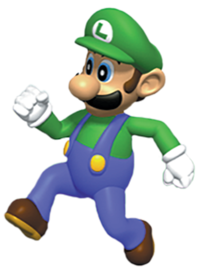
Two years after the widely acclaimed classic Donkey Kong, Shigeru Miyamoto wished to incorporate the two-player competitive and cooperative gameplay of the arcade game Joust into his own game. To this end, he created Luigi, Mario's twin brother, for the arcade game Mario Bros. However, Luigi's actual debut was in the otherwise unrelated Game & Watch game of the same name.[2]
Luigi's name is said to have been inspired by a pizza parlor called "Mario & Luigi's", which was located near Nintendo of America's headquarters.[3] Coincidentally, his name was also noted to be similar to the Japanese word 「類似」 (ruiji), which means "similar", and further ties into his formative years being essentially identical to Mario other than color.[4]
Luigi's original design, both in official artwork and gameplay, was a palette swap of Mario. In this case, his overalls and shirt were green and black, respectively; in addition to contrasting with Mario's red and blue color scheme,[5] Luigi's color scheme came about because of the limited color palettes in the arcade version of Mario Bros.[6] While the Game & Watch version of the game has one player control both brothers, the arcade version features Luigi as the character that the second player would control.[5]
Luigi would then be featured in the widely acclaimed classic Super Mario Bros., which saw the brothers travel through the Mushroom Kingdom for the first time to rescue Princess Toadstool from the evil Koopa King, Bowser. Unlike its predecessor, Super Mario Bros. features Luigi clad in a green shirt, white overalls and white hat, which would become his color scheme as Fire Luigi in subsequent games. This game also notably, albeit quietly, abandoned the concept that he and Mario were Italian-American plumbers from New York City.[7]
In both the Japanese Super Mario Bros.: The Lost Levels and the international Super Mario Bros. 2, Luigi was established as having superior jumping prowess compared to Mario. The Lost Levels also gave him worse traction compared to his brother; both traits would become Luigi's defining gameplay mechanics in the overwhelming majority of subsequent games. Super Mario Bros. 2 further codified Luigi's physical appearance, depicting him as taller and thinner than his brother.
Although Mario effectively became Nintendo's mascot thanks to the success of Donkey Kong and Super Mario Bros., Luigi's relevance, which was still at a respectable level, stagnated in response. Relegated to minor appearances such as Super Mario Kart and the edutainment-based spin-off Mario is Missing!, Luigi's relevance began to wane, so much so that he was actually left out of some games entirely. The most notable instance of this was his complete absence in the widely acclaimed classic Super Mario 64; however, this was attributed to the Nintendo 64's technical limitations, and was rectified by making him an unlockable character in the game's Nintendo DS remake, Super Mario 64 DS.[8]
After his absence in Super Mario 64, however, Luigi's relevance was renewed via his playable appearances in three other very popular Nintendo 64 games: Mario Kart 64, Mario Party, and Super Smash Bros. Luigi's newfound popularity was most notably demonstrated in Luigi's Mansion, his first starring role within his own spin-off series. The game established Luigi's defining personality: bashful and good-hearted, yet cowardly and afflicted by a deep-seated fear of ghosts.
Despite encountering many obstacles and being consistently terrified of the mansion's various ghosts, Luigi nevertheless manages to save Mario from King Boo. Luigi received slightly more character development via the Mario Tennis series: its first installment marked the debut of his antagonistic rival Waluigi, while Mario Power Tennis saw Princess Daisy become a reciprocal love interest for Luigi after her appearance as his caddie in NES Open Tournament Golf.
Although Luigi did not appear in Super Mario Sunshine, his relevance has remained steady since Luigi's Mansion. This has been most obvious with his co-starring role in Mario & Luigi series alongside Mario; his appearance as an unlockable character in Super Mario 64 DS, Super Mario Galaxy, Super Mario Galaxy 2 and Super Mario 3D Land; and his status as one of the four "Heroes of Light" in Super Paper Mario.
Luigi's relevance reached its peak during the Year of Luigi, which was announced on February 14, 2013 and commemorated the 30th anniversary of his debut.[9] Various games and collectibles focusing on Luigi were released, with two of the games, Luigi's Mansion: Dark Moon and Mario & Luigi: Dream Team, further developing his character. Dream Team further cemented the deep bond between the Mario Bros., and saw Luigi courageously rise to the occasion against Bowser, which resulted in his critics—such as Starlow and even Bowser himself—coming to view him as Mario's equal. Dark Moon saw him develop a slightly more courageous attitude, save Mario yet again, and clearly cemented King Boo as his archenemy, evoking reminders of the long-standing rivalry between Mario and Bowser.
Aside from his character development, Luigi's abilities were also highlighted during the Year of Luigi. New Super Luigi U notably lacks Mario and instead focuses on Luigi's signature higher jump and slippery traction. Dr. Luigi marks his debut as a doctor like his brother before him, and sees him utilize unique L-shaped Megavitamins. This game mode returns in the Nintendo 3DS title Dr. Mario: Miracle Cure. Although the Year of Luigi officially concluded on March 18, 2014,[10] one final Year of Luigi game, Super Luigi Bros., was released a little over a month later as a part of NES Remix 2. Like Super Mario 3D World's Luigi Bros., Super Luigi Bros. is a modified emulation of Super Mario Bros., but noticeably differs by retaining Luigi's higher jump and sporting mirrored versions of every level.
Although replicas of Luigi's hat and outfit are available for Mario to wear, Luigi himself returned to an ancillary role for his appearance in Super Mario Odyssey; he appears as the non-playable host of the Balloon World minigame, which was made available in a post-launch update on February 21, 2018.[11] Later that year, a remake of Luigi's Mansion for the Nintendo 3DS was released. This remake introduced Luigi's gelatinous counterpart, Gooigi, who serves as his partner in multiplayer mode. Gooigi also features prominently in Luigi's Mansion 3, a brand new installment in the spinoff series released on October 31, 2019.
In the Luigi's Mansion series
- In the original Luigi's Mansion, Luigi is informed that he had won a mansion in a contest he never actually entered. Prior to his arrival, Mario was observed entering the mansion by the elderly ghost researcher Professor Elvin Gadd, or E. Gadd for short, but never returned. Upon his arrival at the mansion, Luigi realizes his brother is nowhere to be found and is nearly captured by an orange ghost before being saved by E. Gadd. The professor escorts Luigi to his laboratory near the mansion and offers him a crash course in using the Game Boy Horror and Poltergust 3000, a modified vacuum cleaner capable of sucking up ghosts and other objects. With his Poltergust in tow, Luigi musters the courage to re-enter the mansion to find his missing brother. Upon delving deeper into the mansion, Luigi unwillingly unleashes a wave of captured Boos, including their leader King Boo, and must reclaim them before being able to face the king himself. On his way to recapture the Boos, Luigi discovers that King Boo has actually captured Mario and trapped him in a painting. In the final confrontation, the king attempts to stop Luigi using a lifelike Bowser costume, though Luigi ultimately succeeds in capturing King Boo and rescuing his captured brother, freeing him from his painting prison.
- In Luigi's Mansion: Dark Moon, E. Gadd takes his studies to a new venue, Evershade Valley, and makes peace with various friendly ghosts in the area to assist in his research. Unbeknownst to anyone, King Boo managed to escape his portrait prison and shatters the titular Dark Moon, a large floating crystal that normally has a pacifying effect on the ghosts of Evershade Valley. With the Dark Moon destroyed, the friendly ghosts turn hostile and start causing chaos, prompting E. Gadd to retreat and recruit Luigi to help recover the shattered fragments. Along the way, Luigi acquires some new tools to his new Poltergust 5000, including the Dual Scream, Strobulb, and the Dark Light, as he travels to five distinct mansions to recover the Dark Moon fragments. Along the way he and E. Gadd discover that Mario has been captured in a painting again, and in one final illusion he confronts King Boo and succeeds in defeating him in his illusion. With Mario saved and the Dark Moon restored, the ghosts become friendly again and Luigi returns home with a new pet Polterpup in tow.
- In Luigi's Mansion 3, Luigi, his Polterpup, Mario, Peach, and a few Toad assistants have been invited for a vacation at a luxurious high-rise hotel, The Last Resort. Its proprietor, Hellen Gravely, assists the group in checking into the hotel and escorts each of them to their own rooms. That night, Luigi hears Peach cry out in terror and leaves his room to investigate, only to find the initially warm and inviting presence of the hotel to be an illusion. Hellen Gravely appears to personally introduce Luigi to the returning King Boo, whom she managed to set free once again to vow revenge on Luigi. With the others trapped in portraits, King Boo tells him that he plans to finish his collection with a special Luigi portrait. The cowardly brother narrowly escapes though a laundry chute and finds himself in the hotel's bottom floor. He discovers a new Poltergust, model G-00, and climbs to the lobby to discover that Professor E. Gadd was also captured in a painting. Upon freeing him, the two retreat to the basement and Luigi is introduced to two new tools, the Virtual Boo and Gooigi, that will aid him in his trek up the 17 floors of the Last Resort to save his friends and stop King Boo once again.
In Super Smash Bros.
As a playable character
Luigi's first appearance in a fighting game is in Super Smash Bros., where he appears as one of the four unlockable characters. His design is based on his appearance in Mario Kart 64; however, his overalls in-game are colored indigo instead of blue, which references his sprite from Super Mario World. Luigi can be unlocked after completing Break the Targets with all of the starter characters.
Luigi's abilities are almost identical to Mario's, although there are a few differences between them. His neutral special move is also a Fireball, albeit colored green and immune to gravity.[12] Luigi's up special move is also the Super Jump Punch, but his is very polarized compared to Mario's. Due to consisting of a sweetspot and a sourspot, Luigi's version can deal up to 25% when landing the former, but only 1% when landing the latter. Lastly, his down special move is Luigi Cyclone: it is similar to Mario Tornado, but instead consists of only two distinct hits and that each launch the opponent away from Luigi. Unlike the rest of the cast, Luigi's taunt is the only one capable of dealing damage.[12]
Largely because of his awkward physics, Luigi is ranked 12th out of 12 on the current tier list. This places him in the C tier, and at the bottom of the list.
Luigi's in-game character description reads:
- Luigi
- Though often hidden in his older brother Mario's shadow, Luigi, is in reality, very popular. Taller than Mario, Luigi also jumps higher. Although he didn't appear in Super Mario 64, in Mario Kart 64 he performed to the best of his ability. For one who always seems to be in the background, he has many fans who eagerly await his appearance.
- Works:
- Mario Bros (NES)
- Super Mario Bros. 2 (NES)
- Mario Kart 64 (N64)
In Super Smash Bros. Melee
As a playable character
Luigi returns in Super Smash Bros. Melee as an unlockable character. Unlike in SSB, Luigi's overalls in-game are now blue, which makes his design more in line with his appearance as of Mario Kart 64. Luigi can be unlocked in Adventure Mode by finishing the first stage with the number 2 in the timer; in addition to causing him to take Mario's place in the subsequent battle, it may also be a reference to Luigi originally being the player 2 analog to his brother.[12] Luigi can also be unlocked by playing 800 Versus Mode matches.[12]
Due to his neutral attack's third hit, up tilt, down tilt, forward smash, and forward aerial being completely overhauled both aesthetically and mechanically, Luigi has been de-cloned into a semi-clone of his older brother.[12] Like his fellow veterans, Luigi now has a side special move; in his case, it is Green Missile. Green Missile propels Luigi forward and can be charged. In addition to being usable for recovery like Super Jump Punch, Green Missile can potentially misfire, which significantly increases its damage output and travel distance. Lastly, Luigi's taunt is now capable of meteor smashing edge-hanging opponents, although it is extremely situational to use in such a manner.[12]
Due to Luigi's moveset and mobility being improved by direct changes and especially because of Melee's game physics (most notably wavedashing and chain grabbing), he is ranked 13th out of 26 on the current tier list. This places him in the D tier and directly in the middle of the list.
Trophies
As a playable character, Luigi is featured on three trophies: his normal trophy, acquired by clearing Classic Mode with him on any difficulty, and "Smash Red" and "Smash Blue" trophies won by clearing Adventure and All-Star Modes, respectively. A fourth trophy featuring Luigi is also available, which is styled after his appearance in Luigi's Mansion.
His normal and "Vacuum Luigi" trophies read as follows:
Luigi
Although Mario's younger brother has always played second fiddle, Luigi finally garnered the spotlight with his very own game, Luigi's Mansion. Things are looking up for the eternal understudy; he's even picked up his own rival in Waluigi. The day he's referred to as the "lean, mean, green machine" may not be too far off.
- Mario Bros, Arcade 1983
Vacuum Luigi
In a strange twist of fate, Luigi wins a huge mansion in a contest he didn't even enter, and the place turns out to be haunted! After meeting a weird professor named Elvin Gadd, Luigi enters the place armed with a flashlight and a ghost-sucking vacuum cleaner. Mario's trapped somewhere in there! Can Luigi save him?
- Luigi's Mansion, 11/01 (GameCube)
In Super Smash Bros. Brawl
As a playable character
Luigi returns as an unlockable character in Super Smash Bros. Brawl. He can be unlocked by playing 22 Versus Mode matches, completing Classic Mode without using any continues, or by having him join the party in Adventure Mode: The Subspace Emissary. Unlike in SSB and Melee, Luigi's design is now based on his appearance as of Luigi's Mansion, albeit with a realistic aesthetic and subdued color scheme. By extension, he now has his own unique voice clips, instead of using higher-pitched versions of Mario's voice clips.
Like his fellow veterans, Luigi now has a Final Smash; in his case, it is Negative Zone. In the transition from Melee to Brawl, Luigi has received a mix of buffs and nerfs, with the buffs being greater overall, as many of his attacks have been made more powerful or faster, along with a significantly improved recovery. However, Luigi's loss of wavedashing has harmed him drastically, especially with the stronger defensive play of Brawl (and the defensive nature of Brawl also makes his poor traction much more of a liability, as the inability to punish out of shield with it is a more significant problem in Brawl). The introduction of hitstun canceling is also detrimental as it significantly limits Luigi's combo game. As such, despite the overall buffs, Luigi is a much less effective character than he was in Melee.
Trophies
Luigi has a trophy that is awarded each time Classic Mode is completed with him on any difficulty. See Negative Zone for the trophy description of Luigi's Final Smash.
- Luigi
- Mario's younger twin brother. He's shy and quiet and overshadowed by his sibling, but he's actually quite talented. His jumping ability surpasses Mario's, and his all-around skills let him overcome any problem. He's a bit cowardly and really afraid of ghosts. Even so, in Luigi's Mansion, he was charged with cleaning up a whole house full of spirits.
: Mario Bros
: Luigi's Mansion
- Paper Luigi
- The legendary hero Mario's younger brother. He's teased by Koopas and Goombas alike and is sometimes called "green mustache guy." He goes missing after Bowser and Peach's wedding. He's known for his jumping prowess—his special move is the High Jump. It's said that he has a close relationship to the masked man brainwashed by Count Bleck and known only as "Mister L."
: Super Paper Mario
Stickers
| Name | Game | Effect | Character(s) |
|---|---|---|---|
| Luigi | Luigi's Mansion | ||
| Luigi | Mario & Luigi: Superstar Saga | ||
| Luigi | Super Paper Mario | ||
| Luigi & Baby Luigi | Mario & Luigi: Partners in Time | ||
| Mario & Luigi | Mario & Luigi: Superstar Saga |
 Luigi (Luigi's Mansion) |
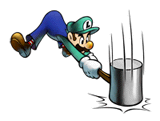 Luigi (Mario & Luigi SS) |
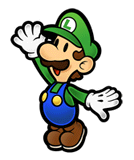 Luigi (Super Paper Mario) |
Luigi & Baby Luigi (Mario & Luigi: PiT) |
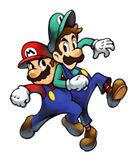 Mario & Luigi (Mario & Luigi SS) |
In Super Smash Bros. 4
As a playable character
Luigi returns as a playable character in Super Smash Bros. 4. However, SSB4 is the first installment of the series to announce him as a playable character before release,[13] as well as the only installment where he is a starter character. Like Mario, Luigi's design is now based on his appearance as of Super Mario 3D Land. He also received a new a new Final Smash that uses the Poltergust 5000 from Luigi's Mansion 2: Dark Moon.
Luigi has been buffed in the transition from Brawl to SSB4. In addition to retaining his overall fast frame data and varied recovery, Luigi's moveset now boasts an impressive amount of utility, particularly in regard to combo potential. This is best demonstrated by Luigi's grab game, which is among the most effective in the game thanks to his quick grabs, his back throw being a viable KOing option, and his down throw's outstanding combo potential.
However, Luigi retains his overall slow mobility, especially while airborne, as well as his extremely low traction. Update 1.1.1 also altered the knockback of his down throw, which removed its guaranteed KO set-ups. Despite his flaws, Luigi overall remains a force to be reckoned with, and he has achieved fairly strong tournament representation and results throughout SSB4's lifespan. As a result, he is ranked 18th out of 55 on the current tier list; in addition to placing him in the B tier, this renders him a high-tier character for the first time.
As a costume
Luigi's hat is available as an headwear for Mii Fighters.
Trophies
Luigi
 Luigi recently celebrated his 30th anniversary with the Year of Luigi, but all that attention just made him even more shy and awkward. In Smash Bros., Luigi takes a lot of cues from his brother in fighting style, adding flair to moves like Super Jump Punch. His taunts, however, are truly unique.
Luigi recently celebrated his 30th anniversary with the Year of Luigi, but all that attention just made him even more shy and awkward. In Smash Bros., Luigi takes a lot of cues from his brother in fighting style, adding flair to moves like Super Jump Punch. His taunts, however, are truly unique. Luigi recently celebrated his 30th anniversary with the Year of Luigi, but all that attention just made him even more shy and awkward. In Smash Bros. (as in life), Luigi tends to follow his brother's lead, but he adds his own flair to moves like Super Jump Punch. His taunts, however, are 100% Weegee.
Luigi recently celebrated his 30th anniversary with the Year of Luigi, but all that attention just made him even more shy and awkward. In Smash Bros. (as in life), Luigi tends to follow his brother's lead, but he adds his own flair to moves like Super Jump Punch. His taunts, however, are 100% Weegee.With the Year of Luigi long gone now, it's up to you to prove to everyone that Mario's cowardly co-star is still awesome. He may share a lot of moves with his brother, but he still puts his own spin on things. When you Super Jump Punch a foe just right, for example, the noise he makes is epic. His taunts are pretty funny too. Try them!
- Appears In
- Mario Bros. 1983
: Luigi's Mansion: Dark Moon 03/2013
Luigi (Alt.)
Luigi may sulk when his down taunt is used, but his little dejected kick can actually hurt a nearby enemy fighter. It can even trigger a meteor smash! Notice an enemy leisurely hanging from the edge? Run over and pout on the edge—that foe will be the one with something to pout about!
Luigi might look a bit sulky when you use his down taunt, but when he does it next to another fighter, it can get in a little hit - well, a "little hit" that can also sometimes be a meteor smash! Say you spot a fighter hanging off the edge of the stage. Just give them a pout and a kick with this taunt, and they'll fall to their doom.
- Appears In
- Mario Bros. 1983
: Luigi's Mansion: Dark Moon 03/2013
Luigi (With Poltergust 3000)
Luigi (With Poltergust 5000)
Luigi's trusty tool, the Poltergust 3000. This isn't your neighbor's boring, old vacuum—the Poltergust 3000 sucks up ghosts! It also can find them when they are hiding and can blow them around a room! Why doesn't every family own one of these, I wonder...
Unlike your run-of-the-mill vacuum cleaner, this one sucks up...ghosts! And it doesn't just suck them up - it blows them around, draws them to you, and even helps you find them when they're hidden. Talk about convenient! No home should be without one. No Luigi should be without one, either.
Tanooki Mario & Kitsune Luigi
If you find a Super Leaf, Mario transforms into Tanooki Mario! His newfound tail works as a weapon and as a propeller to slow his fall. His brother, Luigi, won't turn into a Tanooki, though—he becomes Kitsune Luigi. Wouldn't want to have trouble telling the two apart, would we?
When Mario uses a Super Leaf, he grows a tail and turns into Tanooki Mario, a very handy form indeed. Likewise, Luigi turns into Kitsune Luigi. Both of them can swing their tails to attack enemies, or wag their tails to slowly float down after a jump, almost like they're walking on air.
Paper Luigi
Paper Luigi is Paper Mario's younger brother. He shows up from time to time during Paper Mario's quest for the Royal Stickers, but he doesn't stick around for long. Such a modest guy... I wonder what he's getting up to now!
Paper Mario's little brother, Paper Luigi. While Mario is searching for the Royal Stickers, you might see Luigi here and there, just lounging around in the background. If you try to peel him away like a sticker, he runs off quick as a flash. What on earth are you playing at, Luigi?
Baby Luigi
Despite missing the trademark mustache, the big nose and the L on his cap should be dead giveaways that this is Luigi! When he appeared in Mario Kart: Double Dash!!, Baby Luigi surprised the other racers with his Rattle Buggy driving skills. Adult Luigi probably still remembers those days of racing glory.
Since he's only a baby, he doesn't have the trademark moustache yet, but that big L on his cap and his even bigger nose make him unmistakably Luigi. In Mario Kart: Double Dash!!, his first playable outing, he zooms around the tracks in his Rattle Buggy. Do you think grown-up Luigi remembers all those escapades?
: Super Mario World 2: Yoshi's Island 10/1995
: Yoshi's New Island 03/2014
Mr. L
- He calls himself the Green Thunder, but Mr. L's true identity is a mystery, forever concealed beneath his stylish green hat. With his incredible skill of jumping really high, he makes a valuable addition to Count Bleck's evil forces. Coincidentally, for the whole of Mr. L's reign of terror, Luigi is nowhere to be seen. How odd...
: Super Paper Mario 04/2007
In Super Smash Bros. Ultimate
As a playable character
Luigi returns as an unlockable character in Super Smash Bros. Ultimate.[14] Like Mario, Luigi's design is now based on his appearance in Super Mario Odyssey, albeit without the accessories he wears in that game. In addition, Luigi now uses his Poltergust G-00 from Luigi's Mansion 3 for his grabs (which also grants him a grab aerial by extension), pummel and throws;[15] fittingly, it also replaces the Poltergust 5000 for his Final Smash.
Although Luigi received a new up tilt that is aesthetically and mechanically similar to his older brother's, the combination of his Poltergust G-00, new dashing animation, and new forward tilt have collectively de-cloned him into a pseudo-clone of Mario after previously being a semi-clone from Melee to SSB4.
As a costume
Once again, Luigi's hat is available as headwear for Mii Fighters. It can be found in a Treasure Chest in World of Light.
Spirits
- Fox Luigi Spirit.png
25. Fox Luigi
- Goo Goo Buggy Spirit.png
81. Goo Goo Buggy
Trivia
- Much like in their home series, Luigi is largely perceived as being in Mario's shadow within the Super Smash Bros. series. Aside from Super Smash Bros. 4, Luigi has been an unlockable character, whereas Mario has consistently been a starter character. In Super Smash Bros., the notice for unlocking Luigi described him as "The Eternal Understudy". In Super Smash Bros. Melee, one method to unlock Luigi is by clearing the first level (Mushroom Kingdom) in Adventure Mode with the timer set to the number 2 in the seconds area. (XX:X2:XX), which results in him being fought on Mushroom Kingdom II. In Super Smash Bros. Brawl, one of the ways to unlock Luigi is to play exactly 22 versus matches; additionally, Snake's Codec Conversation sees Colonel Roy Campbell describe Luigi as the "King of Second Bananas". His Boxing Ring character title in SSB4 is "The Eternal Understudy", which continues his "second hand" theme and is a direct reference to his notice in SSB.
- Luigi and Jigglypuff are the only characters to appear in SSB, Melee, Brawl and Ultimate as unlockable characters.
- Luigi has always been portrayed as being slower at dashing compared to Mario in the Super Smash Bros. series. However, aside from certain games, such as the Mario & Luigi series, Mario is generally the slower runner of the two.
- Similarly, from Melee onward, Mario has been portrayed as being slightly weaker than Luigi. However, the Mario series has generally depicted Luigi as being slightly weaker than Mario.
- Luigi's floatiness in the Super Smash Bros. series is similar to his mobility physics that debuted in Super Mario Bros. 2.
- Despite being able to wall jump in all but one Mario game, Luigi has been unable to do so in any Super Smash Bros. game.
- However, he was able to wall jump in the early E3 build of Super Smash Bros. for Nintendo 3DS.
- Prior to Brawl, Luigi had no unique sound effects whatsoever, despite having his own distinct voice beginning with Mario Kart 64, which was released before SSB. Instead, his voice clips and sound effects in SSB are simply higher-pitched versions of Mario's from Super Mario 64, while Luigi Cyclone's voice clip and sound effect are directly copied from Mario Tornado. In Melee, Luigi received only one unique sound effect: the spring sound effect from Super Mario World for his planking victory pose.
- Due to appearing in Luigi's Mansion, a launch title for the Nintendo GameCube, Luigi is the only character in Melee to appear as a playable character on the Nintendo GameCube before Melee's release.
- Luigi, Yoshi, Snake, Corrin, and Joker are the only playable characters to feature material from games scheduled for release after an installment of Super Smash Bros. In Luigi's case, the Poltergust G-00 from Luigi's Mansion 3 is used for his grabs, pummel, throws, grab aerial and Final Smash in Super Smash Bros. Ultimate.
References
- ^ Luigi called the deuteragonist of Mario franchise. IGN. Retrieved July 31, 2017.
- ^ Mario Bros. info page on In The Attic, a website dedicated to classic video games
- ^ Mario Bros. at The International Arcade Museum
- ^ Super Mario: The New Craze in Japan
- ^ a b IGN Presents The History of Super Mario Bros.
- ^ Shigeru Miyamoto Shares Nintendo Secrets
- ^ "Q&A: 'Mario' creator Shigeru Miyamoto".
- ^ Iwata Asks: Super Mario 3D World
- ^ Nintendo Direct 2.14.2013
- ^ Shigeru Miyamoto's Miiverse post announcing the end of the Year of Luigi
- ^ Nintendo of America on Twitter: February 21, 2018
- ^ a b c d e f News Flash! Super Smash Bros. Dojo: Luigi - Source Gaming
- ^ Nintendo Direct 8.7.13
- ^ Super Smash Bros. Ultimate - E3 2018 - Nintendo Switch
- ^ Super Smash Blog | 09: Luigi
| Character Inspirations for Mii Fighter Costumes in Super Smash Bros. 4 | |
|---|---|
| Akira · Captain Falcon · Flying Man · Heihachi · Jacky · King K. Rool · Knuckles · Toad | |
| Ashley · Black Knight · Chrom · Dunban · Gil · Link · Lloyd · Monster Hunter · Takamaru · Viridi · Zero | |
| Fox · Geno · Inkling · Isabelle · K.K. Slider · MegaMan.EXE · Proto Man · Samus · Tails · X | |
| Headgear only | Barbara · Chain Chomp · Chocobo · Daisy · Inkling Squid · Luigi · Majora's Mask · Mario · Meta Knight · Peach · Red Shell · Sheik · Shy Guy · Spiny · Super Mushroom · Waluigi · Wario · Zelda |
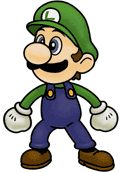
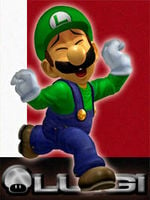

![Smash [Adventure Mode] trophy](https://ssb.wiki.gallery/images/thumb/b/bb/Luigi_Trophy_%28Smash%29.png/69px-Luigi_Trophy_%28Smash%29.png)
![Smash [All-Star Mode] trophy](https://ssb.wiki.gallery/images/thumb/6/66/Luigi_Trophy_%28Smash_2%29.png/73px-Luigi_Trophy_%28Smash_2%29.png)

